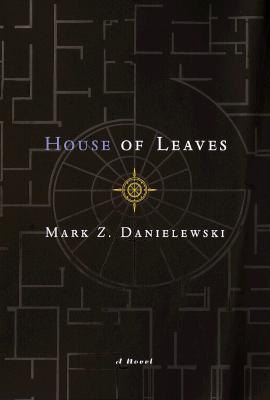House of Leaves by Mark Z. Danielewski falls within the genre of horror and it’s honestly not something I generally pick up. Thanks to my brother-in-law’s recommendation and the Book Challenge that encouraged me to read a book from a genre I don’t normally frequent, I decided to give it a go. Thanks to a birthday book voucher, I acquired the book and set out to read it one evening, scoffing at the idea that a book could actually scare me. Heh. Little did I know.
House of Leaves is presented as an academic work written by a blind man called Zampano and then compiled and edited by Johnny Truant after Zampano’s death. The thesis examines a film, The Navidson Record, which is a documentary by a famous photographer, Will “Navy” Navidson, who documents his family’s move into a house. Doesn’t sound too scary? Just wait.
It’s a strange collection of theory supported heavily by referenced footnotes, which implies what’s written is truth. Yet Truant frequently comments that The Navidson Record doesn’t actually exist. Neither do some of the secondary sources, while those who do exist have never heard of the documentary, let alone written a paper on it, as Truant discovers after contacting them. Zampano’s academic work is increasingly interspersed with insights revealing Truant’s quickly unraveling state of mind and how his obsession with Zampano’s work is destroying him.
As the narrative progresses, even how the text appears on the page starts to warp. Pages with only a handful of words echo the bizarre nature of the house. Windows within paragraphs reveal densely packed words, and when you turn the page, the windows are still present except the words are backwards as if you’re peering through the page itself. Gravity, or the lack of it, is represented with a narrow column of sentences read from bottom to top.
While there are plenty of interesting characters in House of Leaves – Truant, Zampano, Navy, and Karen to name a few – the most interesting would be the house. I don’t want to spoil it, but the house is deeply disturbing, threatening the idiom “safe as houses” in a slow, creeping way until it’s larger than life and all consuming.
That first night, when I read the first few chapters of House of Leaves, safe in bed with the covers drawn up, I couldn’t help but feel unsettled. After I finally turned off the light and went to sleep, my thoughts lingered on the house. I dreamt of narrow, dark hallways. Impossible rooms. A growl so low it’s felt, not heard. I dreamt of a child, calling from her bedroom, and I entered the room only to realise we weren’t alone. Something big, oppressive, and yet invisible loomed over me and I wanted to run, run, run, except the child was still there and I needed to save her. I woke, trying so hard to scream, but I couldn’t make a sound.
I read the rest of House of Leaves on the bus to and from work. It took me weeks, but there was no way I was reading it before bed again.
I wouldn’t quite say I enjoyed reading this book. I was fascinated, though, but it definitely isn’t everyone’s cup of tea. I’ve read my fair share of academic literature, so I like how Danielewski uses the structure of an academic paper to tell a story. The book doesn’t just use words, but also colour and shape to emphasise and explore themes in interesting ways. I want to share a small fragment with you to give you a taste of both the kind of narrative told as well as its unsettling nature. For best effect, this is best read in a dimly lit, quiet room, alone.
”…focus on these words, and whatever you do don’t let your eyes wander past the perimeter of this page. Now imagine just beyond your peripheral vision, maybe behind you, maybe to the side of you, maybe in front of you, but right where you can’t see it, something is quietly closing in on you, so quiet in fact you can only hear it as silence. Find those pockets without sound. That’s where it is. Right at this moment. But don’t look. Keep your eyes here. Now take a deep breath. Go ahead take an even deeper one. Only this time as you start to exhale try to imagine how fast it will happen, how hard it’s going to hit you, how many times it will stab your jugular with its teeth or are they nails?, don’t worry, that particular detail doesn’t matter, because before you have time to even process that you should be moving, you should be running, you should at the very leastbe flinging up your arms – you sure as hell should be getting rid of this book – you won’t have time to even scream. Don’t look” (Danielewski 26-27).

